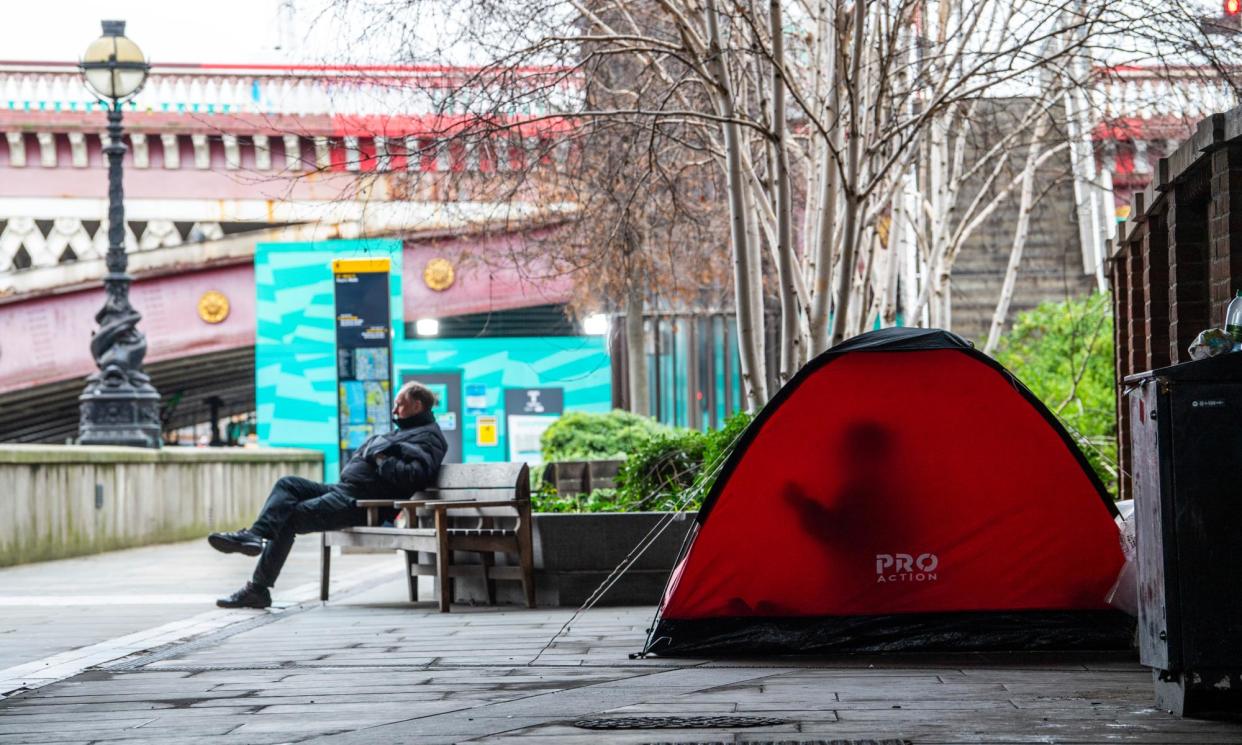Call for refugees in UK to have twice as long to find homes after hotel evictions

Leading homelessness and refugee charities have called on the government to double the number of days that newly recognised refugees are given to find a home before being evicted from asylum hotels, after a near 1,000% rise in rough sleeping among Home Office accommodation leavers since July.
In a letter addressed to James Cleverly, 16 homelessness and refugee charities – including St Mungo’s, Shelter and the Refugee Council – called on the home secretary to increase the number of days refugees granted leave to remain in the UK are given to move out of Home Office accommodation from 28 to at least 56 days.
The charities called for the Home Office to work with them to create a fully funded transition process for people whose asylum support is due to end that enables information and support around housing and benefits to be given as far in advance as possible.
They also called for evictions to be staggered and for small delays for those in the process of working with councils and charities to find different housing.
Government statistics released in February showed a 965% increase over about six months in people sleeping rough after leaving asylum accommodation in the UK, jumping from 42 people in July 2023 to 469 by December 2023.
Last July the Home Office introduced an administrative change that resulted in refugees being evicted from hostels with seven days’ notice. In December, this was quietly reversed and returned to the 28-day notice period that was in place previously. Despite this, large numbers of newly recognised refugees continue to sleep rough after the U-turn.
Figures released by London Councils, which represents boroughs in the capital, show that in January 311 people were forced to sleep rough in London after leaving Home Office accommodation, up 41% from November 2023 and 117% from October 2023.
Sadiq Khan, the mayor of London, said: “The rise in homelessness amongst refugees is extremely alarming and should be a wake-up call for ministers. Despite the huge amount of work being done to end rough sleeping in London, this is a national crisis and we can’t solve it alone.
“The government’s hostile approach to migrants means that hundreds of people in London who have been recognised as refugees in need of protection are being made homeless unnecessarily and forced to sleep on our streets.
“At the same time, the cost of living crisis and government inaction on welfare reform is putting more and more Londoners at risk of losing their homes and ending up with nowhere to go.
“I’m determined to do everything possible to end rough sleeping in the capital but we need the government to step up and match our ambition.”
One refugee, who is being supported by St Mungo’s, spent two years in a Home Office hotel before being granted refugee status. He was given 28 days to leave but ended up sleeping rough after not being able to find somewhere else to live in time. He was found sleeping on the streets by a support worker. “I was so cold and scared, I started experiencing bad back pain. I couldn’t sleep at all,” he said.
“I’m a qualified mechanic. I want to start working and supporting myself but it’s so hard to work when you don’t have somewhere to live and especially when you are sleeping on the streets. I don’t want to be dependent on anyone else, I just need some help to get myself sorted.”
The calls for action in the letter were worked out in a roundtable held last month, where it was said makeshift refugee camps were springing up near hotels that were being cleared out by the Home Office. There was concern that a number of negative decisions expected in the coming months could lead to an ever sharper rise in rough sleeping because individuals would not be able to legally work or access state assistance.
A government spokesperson said: “Once a newly recognised refugee is issued a biometric residence permit, they get 28 days to move on from asylum accommodation.
“Support is also available through Migrant Help and their partners, which includes advice on how to access universal credit, the labour market and where to get assistance with housing.
“We are working with local authorities to manage the impact as we reduce the number of asylum seekers awaiting a decision.”


